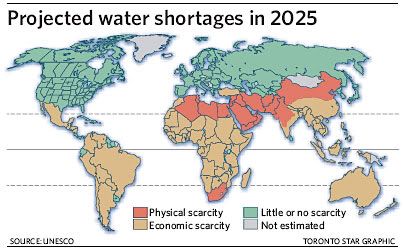Quote:
UN to vote on right to water
‘Historic’ chance to ease human suffering, says Canadian activist
By Linda Diebel National Affairs Writer

A United Nations vote to recognize water as a basic human right is a “historic” chance for the global community to ease human suffering, according to a Canadian activist in the thick of a last-ditch lobbying effort.
“We’re running out of water and the crisis is getting worse,” Maude Barlow said Monday from New York, on the eve of a vote expected as early as Wednesday at the UN General Assembly.
“If we don’t make a statement that we don’t want entire populations left behind, what does it say about us? About our humanity?”
Barlow, former senior adviser on water at the UN and chair of the Council of Canadians citizens group, is optimistic the resolution will pass by majority vote.
However, it appears powerful nations — including Canada — either will not support it or will push for a version that Barlow says would continue to allow water to be bought and sold as a commodity.
“My fear is that the world is going to be divided into North and South — developed and developing nations — and that’s a disaster for the United Nations and for the world,” said Barlow. She was referring to apparent behind-the-scenes opposition by the U.S., Australia, New Zealand and Britain and other European countries, as well as Canada.
At a time when 2 billion people live in water-stressed regions, the resolution declares that “safe and clean drinking water and sanitation (are) a human right.”
The lobby campaign includes a letter from Canadian social, environmental and labour organizations to Prime Minister Stephen Harper, appealing for Canada’s support at the UN for the resolution.
Barlow says no government wants to publicly support the increasing privatization of water and the concept that it can be withheld from people who can’t afford to pay. But she says support for endless studies or a guarantee only of “access” to water would essentially do just that.
The resolution is sponsored by 32 countries, with Bolivia playing a key role. A decade ago, civil unrest erupted in Bolivia’s third-largest city, Cochabamba, after the water supply was privatized and put under the control of a multinational corporation. Even the water in people’s rooftop cisterns was taxed.
Although the rioting led to control of water in that area eventually falling back in the hands of a public utility, corporate control of water is increasing around the world.
A Foreign Affairs spokesperson said in an email Tuesday that Canada already “recognizes there are linkages between access to safe drinking water and certain existing human rights obligations,” and supports further study on the issue of water as a right.
The email also said Canada asserts “its international human rights obligations in no way limit its sovereign right to manage its own resources.”
Barlow dismisses the argument that Canada’s water resources could be jeopardized by the proposed UN resolution. She says the sweeping 1948 Universal Declaration of Human Rights doesn’t mean Canada has to guarantee jobs or pensions for every country.
In 2008, the Conservative government played a pivotal role in manoeuvres to block the UN Human Rights Council in Geneva from recognizing water as a right. The council is studying the issue.
Time is critical, says Barlow, because the world is facing “a double whammy”: continued lack of water through poverty and the growing physical and ecological crisis that deprives the world of clean water
|
UN to vote on right to water - thestar.com
This whole idea is kind of bizarre to me.
I have always lived in a region known for having the largest concentration of fresh water in the world. The Great Lakes are freshwater bodies the size of seas. We take having water whenever we want it for granted. And we use a hell of a lot.
Canadians use 1,500 cubic metres of water per person per year, which is exceeded only by the U.S. (As a comparison, the consumption in France is under 700, while the U.K. consumption rate is under 200.) So, yeah, I take having access to water for granted.
So what about those who either a) cannot afford water, or b) simply don't have access to it? (Or c) both?)
I must say that the thought of groups having little or no access to water is a terrible thing, and I know it happens. What's worse, is the thought of people not having access to water because
they can't afford it.
I believe access to water should a human right, and it pains me that Canada might either vote against this or request a revision that would suggest that water as a commodity is tolerable.
- Is access to water a human right?
- Is it permissible to treat water as a commodity?
- Should there be a global initiative to ensure everyone has an amount of water that would be considered a "survival amount"?
When we talk about inalienable rights, we may think of the freedom to do things or having freedom from things....but what about the right to access something as essential as water?